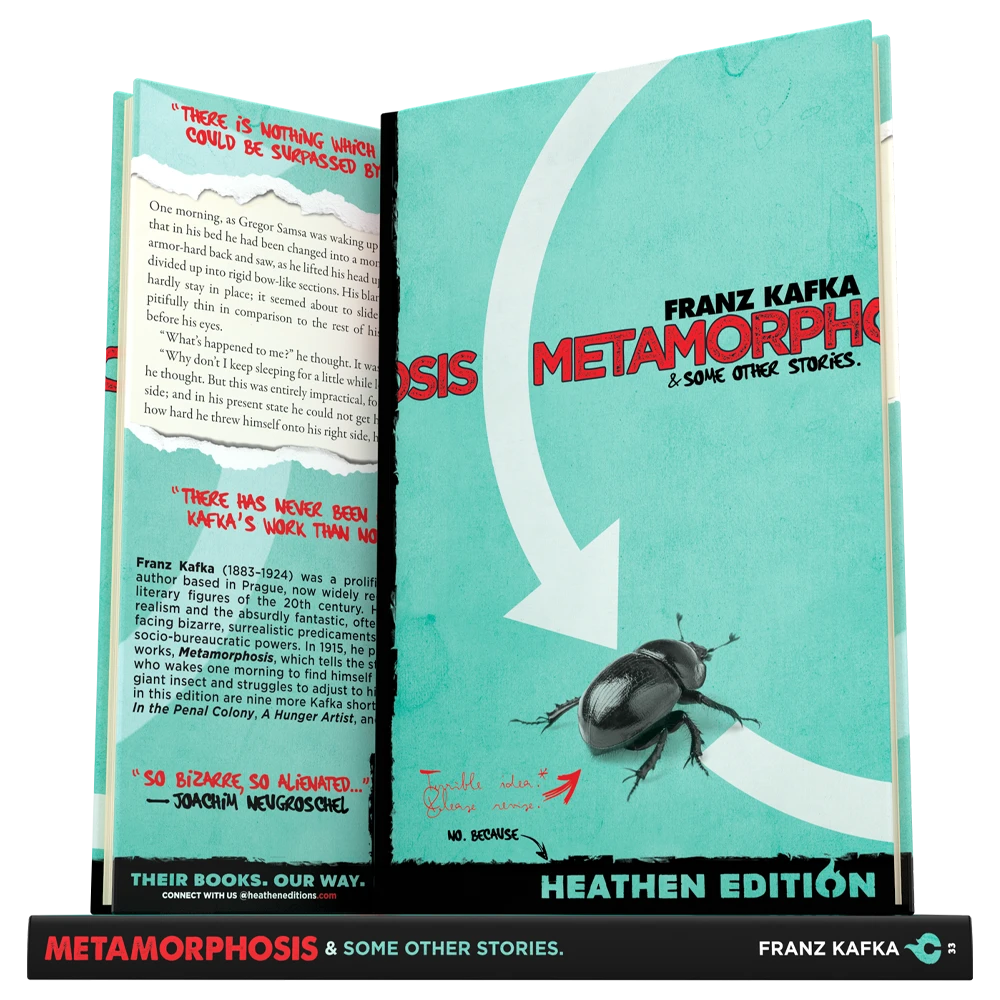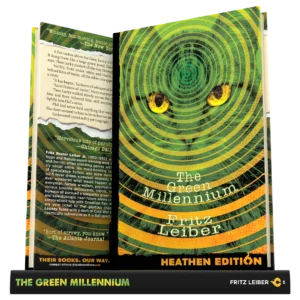No products in the cart.

Metamorphosis & Some Other Stories.
Spine #33
Author
Franz Kafka
Translator
Ian C. Johnston
First Edition
1915
Heathen Edition
June 6, 2023
Refreshed
Pages
160
Heathen Genera
Absurdicrous
Paperback ISBN
978-1-948316-33-0
Hardcover ISBN
978-1-963228-33-5
One morning, as Gregor Samsa was waking up from anxious dreams, he discovered that in his bed he had been changed into a monstrous verminous bug. He lay on his armor-hard back and saw, as he lifted his head up a little, his brown, arched abdomen divided up into rigid bow-like sections. His blanket perched high on this belly could hardly stay in place; it seemed about to slide off completely. His numerous legs, pitifully thin in comparison to the rest of his circumference, flickered helplessly before his eyes.
"What’s happened to me?" he thought. It was no dream.
"Why don’t I keep sleeping for a little while longer and forget all this foolishness?" he thought. But this was entirely impractical, for he was used to sleeping on his right side; and in his present state he could not get himself into this position. No matter how hard he threw himself onto his right side, he always rolled onto his back again.
Franz Kafka (1883–1924) was a prolific German-speaking Bohemian author based in Prague, now widely regarded as one of the principal literary figures of the 20th century. His stories, infused with acute realism and the absurdly fantastic, often feature isolated protagonists facing bizarre, surrealistic predicaments and bewildering, impenetrable socio-bureaucratic powers. In 1915, he published one of his best-known works, Metamorphosis, which tells the story of salesman Gregor Samsa, who wakes one morning to find himself inexplicably transformed into a giant insect and struggles to adjust to his new condition. Also collected in this edition are nine more Kafka short stories and parables, including In the Penal Colony, A Hunger Artist, and A Report for an Academy.
Test Your Might
Paperback
OTHER RETAILERS
Rate & Shelve It
Hardcover
OTHER RETAILERS
Rate & Shelve It
"There has never been a better time for Kafka's work than now."
Anne Rice
Heathenry
Contents
Praise
Details
Heathenry
We’ve been working on this book to varying degrees for five years, and it has experienced three major reconfigurations before we finally landed on this version you now bear.
At some point we realized that attempting to assign order to these particular short stories was very similar to how one might organize songs on a mixtape. You remember those, right? What we mean is that a good mixtape back in the day had a natural flow to it, one song naturally led into the next song so that the result was a satisfying experience as a whole. Absurdism was Kafka’s forte and so we let that be our guide for the story order of this — if you will — Kafka “mixtape.”
Little editing Heathening was required on our part as we’ve only corrected a few stray punctuation errors. We’ve also appended over 30 footnotes where (we thought) necessary.
Lastly, if you can’t tell by the cover, we had a lot of fun with this one! Especially after discovering Kafka’s directive for any Metamorphosis cover art, which everyone everywhere has seemed to patently ignore for the most part. Naturally, our first thought after discovering that was, “How can we Kafka Kafka? Should we Kafka Kafka? Would Kafka Kafka Kafka? If Kafka Kafkaed Kafka, then how would Kafka Kafka Kafka?” Et voila!
Given what lies ahead, it seems masochistic to say, but enjoy!
Contents
Heathenry: Thoughts on the Text
Metamorphosis
Metamorphosis
- Part 1
- Part 2
- Part 3
- An Imperial Message
- The Hunter Gracchus
- A Hunger Artist
- Before the Law
- In the Penal Colony
- Up in the Gallery
- Jackals & Arabs
- A Country Doctor
- A Report for an Academy
Praise
“One of the few great and perfect works of the poetic imagination written . . . there is nothing which The Metamorphosis could be surpassed by.” —Elias Canetti
“Kafka articulates the anguish of being human.” —Ernst Pawel
“Without sci-fi trappings of any kind, The Metamorphosis forces us to think in terms of analogy, of reflexive interpretation, though it is revealing that none of the characters in the story, including Gregor, ever does think that way.” —David Cronenberg
“The world of Kafka’s writing is so bizarre, so alienated, so grotesque that a both humorous and anguished incongruity arises from the juxtaposition of subject and style, absurdity and realism.” —Joachim Neugroschel
“The Metamorphosis conveys Kafka’s essential vision: to be a writer is to be condemned to irreparable estrangement.” —Stanley Corngold
“You will mark Kafka’s style. Its clarity, its precise and formal intonation in such striking contrast to the nightmare matter of his tale. No poetical metaphors ornament his stark black-and-white story. The limpidity of his style stresses the dark richness of his fantasy. Contrast and unity, style and matter, manner and plot are most perfectly integrated.” —Vladimir Nabokov
“Here was a story that defied logic completely and with complete conviction, and it meant something. I wanted to read the story over and over. I have read it countless times since. I’m fascinated by Gregor’s loneliness, by his disintegration. And I know I’m reading one of the finest statements ever made on alienation and cruelty, on how we will kill those whom we will not love and will not try to save.” —Anne Rice
Details
Metamorphosis & Some Other Stories.
Heathen Edition #33Format: Paperback
Interior: Black & White on Cream Paper
Pages: 160 (+2 POD)
Language: English
Annotations: 32 Footnotes
Illustrations: 17
The Heathen Newsletter
Want to be kept in the loop about new Heathen Editions, receive discounts and random cat photos, and unwillingly partake in other tomfoolery? Subscribe to our newsletter! We promise we won’t harass you – much. Also, we require your first name so that we can personalize your emails. ❤️
@heatheneditions #heathenedition
Copyright © 2026 Heathen Creative, LLC. All rights reserved.




